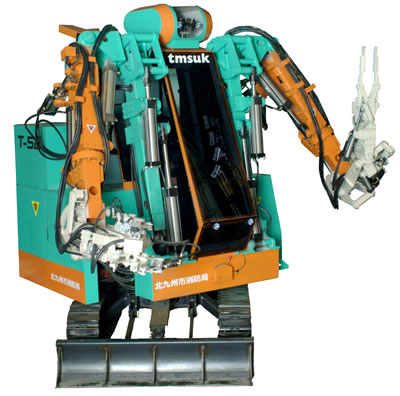Science Fiction
Dictionary
A B C D E F G H I J K L M N O P Q R S T U V W X Y Z
Raytheon Sarcos Exoskeletonized Ditch Witch

Raytheon-Sarcos engineers have obviously been enjoying themselves lately. Take a look at this modified Ditch Witch that now serves as an elaborate Synchronous Reduplicating Pantograph.
(Raytheon Sarcos Exoskeletonized Ditch Witch)
As Vice President of Operations Fraser Smith describes, "every way you move, your three degrees of freedom in your wrist, the one in your elbow and the three in your shoulder --the slave arms can move the same way you do."The robot translates movements with what is called "force reflection." In the hands of the machine is incredible strength and agility, depending on what is needed to fulfill the task at hand.
"Anything that slave encounters in terms of force is also fed back to the operator so he can actually feel what's happening in the workspace," Fraser Smith, Vice President of Operations at Raytheon, told KSL Utah. "With added strength, the operator doesn't need two or three guys trying to muscle something around. This thing just picks it up and dexterously positions the material."
Robert Heinlein was the first person to describe the idea of teleoperated robotic devices in his 1942 story Waldo.
Waldo put his arms into the primary pair before him; all three pairs, including the secondary pair before the machine, came to life. Waldo flexed and extended his fingers gently; the two pairs of waldoes in the screen followed in exact, simultaneous parallelism.
(Read more about Heinlein's waldo)
Fans of Robot Jox, a 1990 movie, may find this idea familiar. Watch in amazement as enormous stop-action animated robots duke it out for giant robot supremacy!
(Robot Jox fight it out! [Starts around 2:00])
I can't resist these amazing amplifiers of human effort; be sure to read more about the Tmsuk T52 Enryu Support Dragon Hyper Rescue Robot, which uses similar principles.

Via KSL; thanks to Vududadi for pointing this story out.
Scroll down for more stories in the same category. (Story submitted 10/13/2011)
Follow this kind of news @Technovelgy.| Email | RSS | Blog It | Stumble | del.icio.us | Digg | Reddit |
Would
you like to contribute a story tip?
It's easy:
Get the URL of the story, and the related sf author, and add
it here.
Comment/Join discussion ( 3 )
Related News Stories - (" Robotics ")
Atlas Robot Makes Uncomfortable Movements
'Not like me. A T-1000, advanced prototype. A mimetic poly-alloy. Liquid metal.' - James Cameron, 1991.
Humanoid Robots Tickle The Ivories
'The massive feet working the pedals, arms and hands flashing and glinting...' - Herbert Goldstone, 1953.
Golf Ball Test Robot Wears Them Out
"The robot solemnly hit a ball against the wall, picked it up and teed it, hit it again, over and again...' - Frederik Poh, 1954.
PaXini Supersensitive Robot Fingers
'My fingers are not that sensitive...' - Ray Cummings, 1931.
Technovelgy (that's tech-novel-gee!) is devoted to the creative science inventions and ideas of sf authors. Look for the Invention Category that interests you, the Glossary, the Invention Timeline, or see what's New.
Science Fiction
Timeline
1600-1899
1900-1939
1940's 1950's
1960's 1970's
1980's 1990's
2000's 2010's
Current News
The New Habitable Zones Include Asimov's Ribbon Worlds
'...there's a narrow belt where the climate is moderate.'
Can One Robot Do Many Tasks?
'... with the Master-operator all you have to do is push one! A remarkable achievement!'
Atlas Robot Makes Uncomfortable Movements
'Not like me. A T-1000, advanced prototype. A mimetic poly-alloy. Liquid metal.'
Boring Company Drills Asimov's Single Vehicle Tunnels
'It was riddled with holes that were the mouths of tunnels.'
Humanoid Robots Tickle The Ivories
'The massive feet working the pedals, arms and hands flashing and glinting...'
A Remarkable Coincidence
'There is a philosophical problem of some difficulty here...'
Cortex 1 - Today A Warehouse, Tomorrow A Calculator Planet
'There were cubic miles of it, and it glistened like a silvery Christmas tree...'
Perching Ambush Drones
'On the chest of drawers something was perched.'
Leader-Follower Autonomous Vehicle Technology
'Jason had been guiding the caravan of cars as usual...'
Golf Ball Test Robot Wears Them Out
"The robot solemnly hit a ball against the wall, picked it up and teed it, hit it again, over and again...'
Boring Company Vegas Loop Like Asimov Said
'There was a wall ahead... It was riddled with holes that were the mouths of tunnels.'
Rigid Metallic Clothing From Science Fiction To You
'...support the interior human structure against Jupiterís pull.'
Is The Seattle Ultrasonics C-200 A Heinlein Vibroblade?
'It ain't a vibroblade. It's steel. Messy.'
Roborock Saros Z70 Is A Robot Vacuum With An Arm
'Anything larger than a BB shot it picked up and placed in a tray...'
A Beautiful Visualization Of Compact Food
'The German chemists have discovered how to supply the needed elements in compact, undiluted form...'
Bone-Building Drug Evenity Approved
'Compounds devised by the biochemists for the rapid building of bone...'
